人教版九年级全册Unit 2 I think that mooncakes are delicious!SectionA Grammar focus 4a-4c 课件(共49张PPT)
文档属性
| 名称 | 人教版九年级全册Unit 2 I think that mooncakes are delicious!SectionA Grammar focus 4a-4c 课件(共49张PPT) | 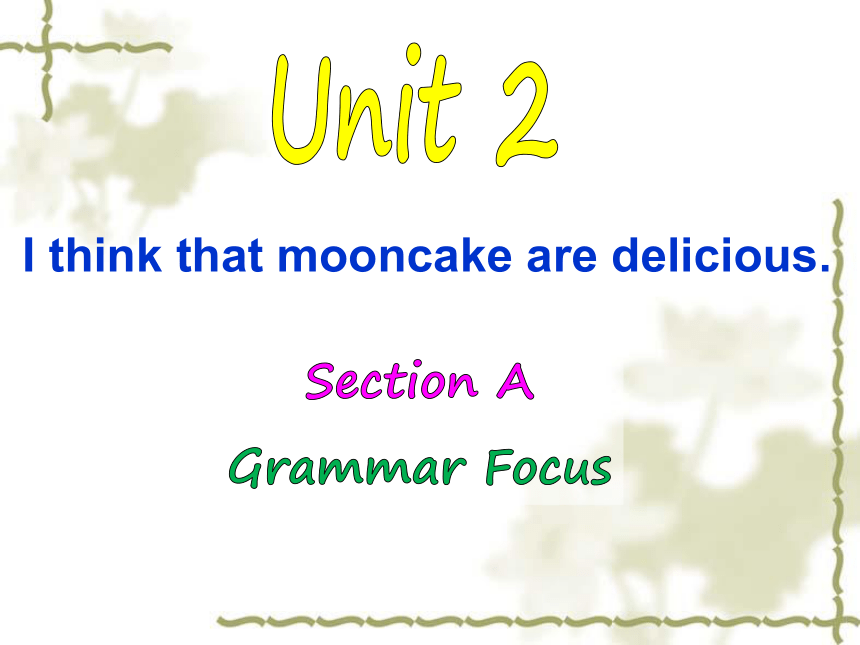 | |
| 格式 | ppt | ||
| 文件大小 | 5.9MB | ||
| 资源类型 | 教案 | ||
| 版本资源 | 人教新目标(Go for it)版 | ||
| 科目 | 英语 | ||
| 更新时间 | 2022-11-10 10:20:04 | ||
图片预览

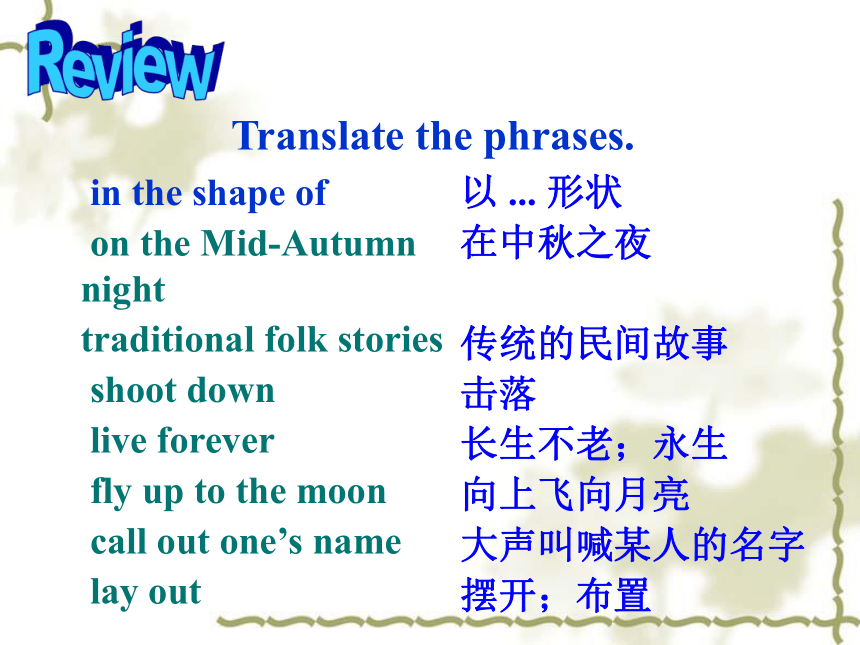
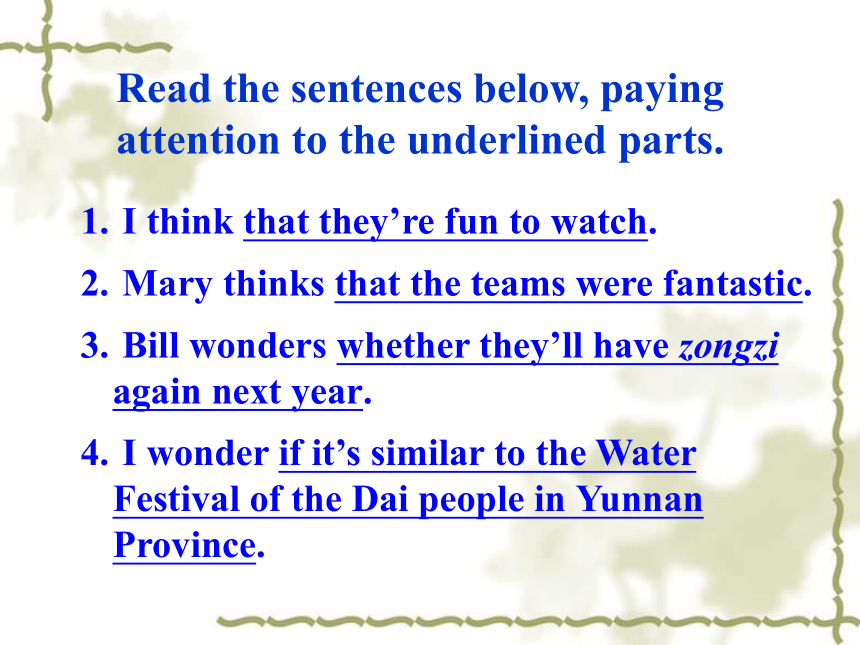
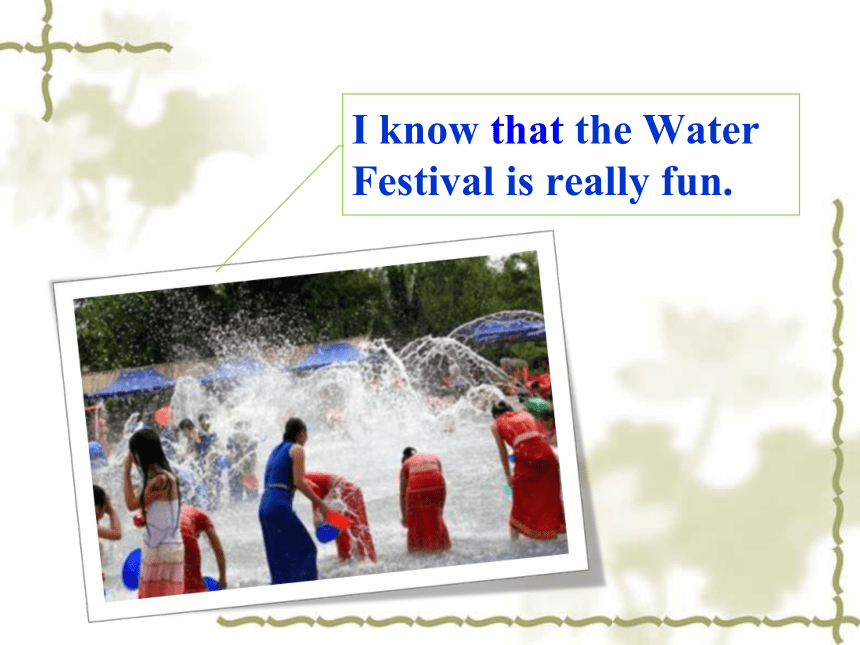
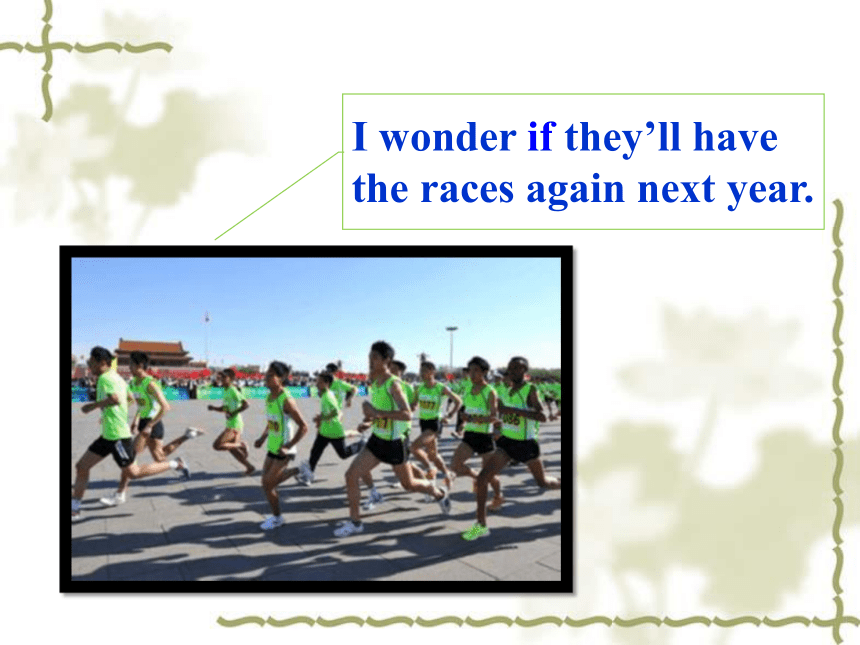

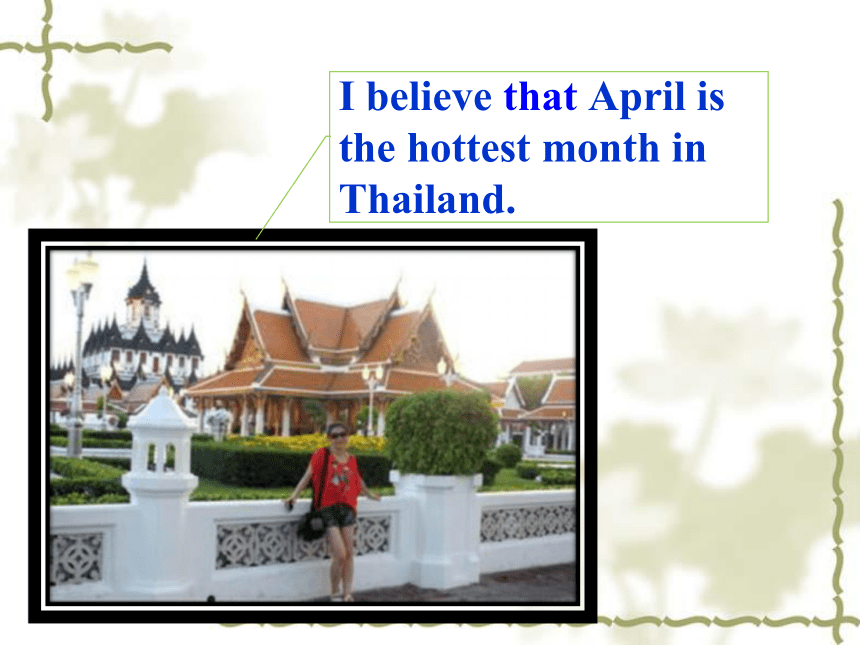
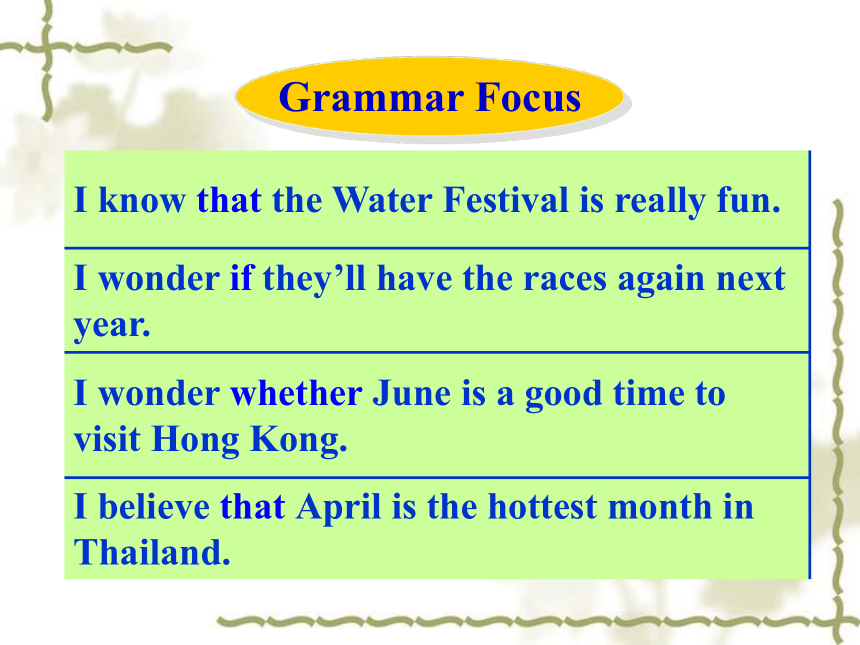
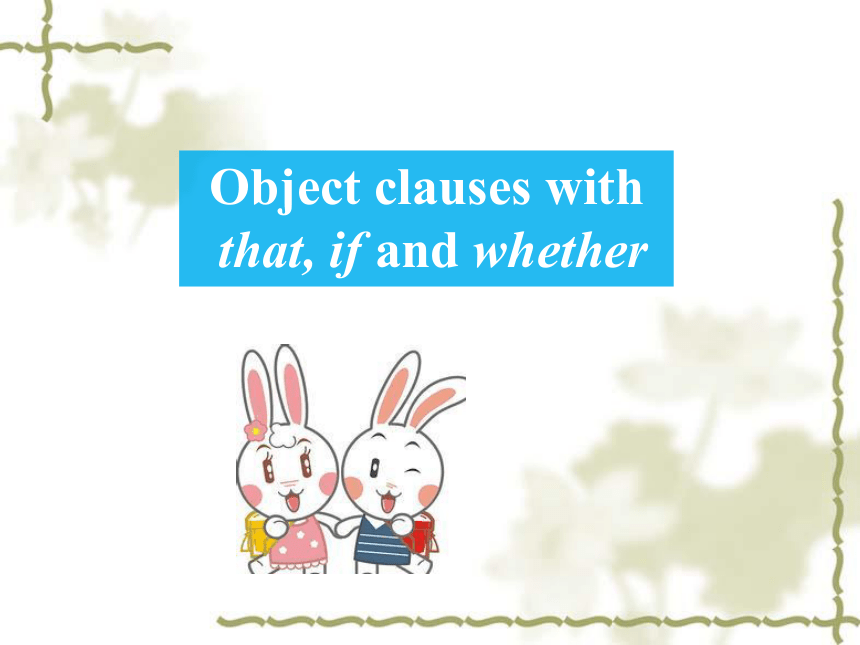
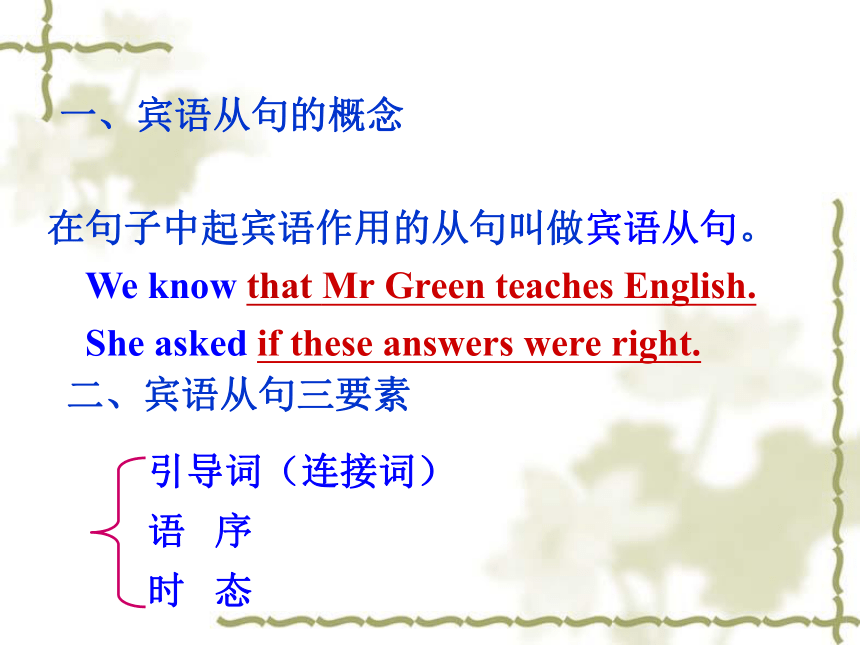
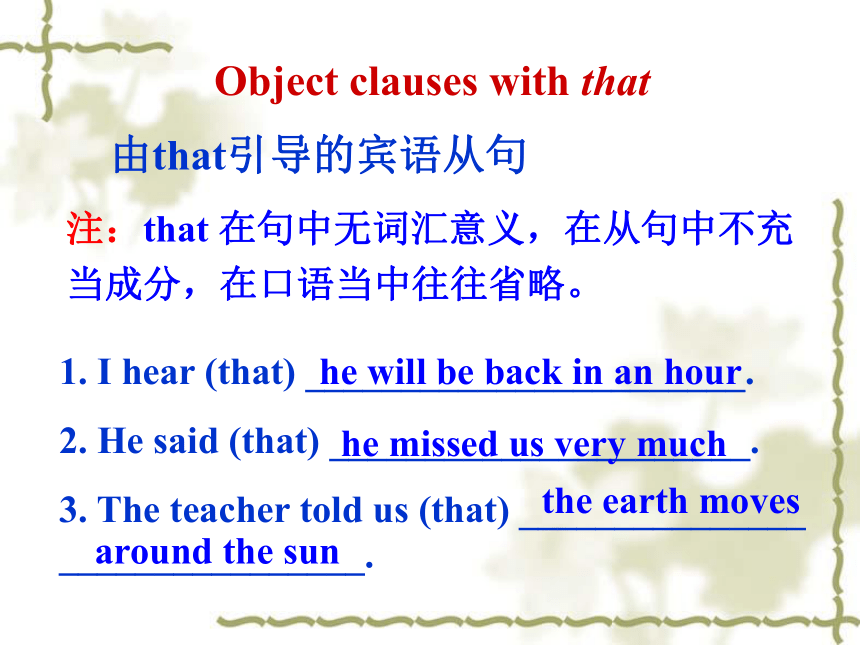
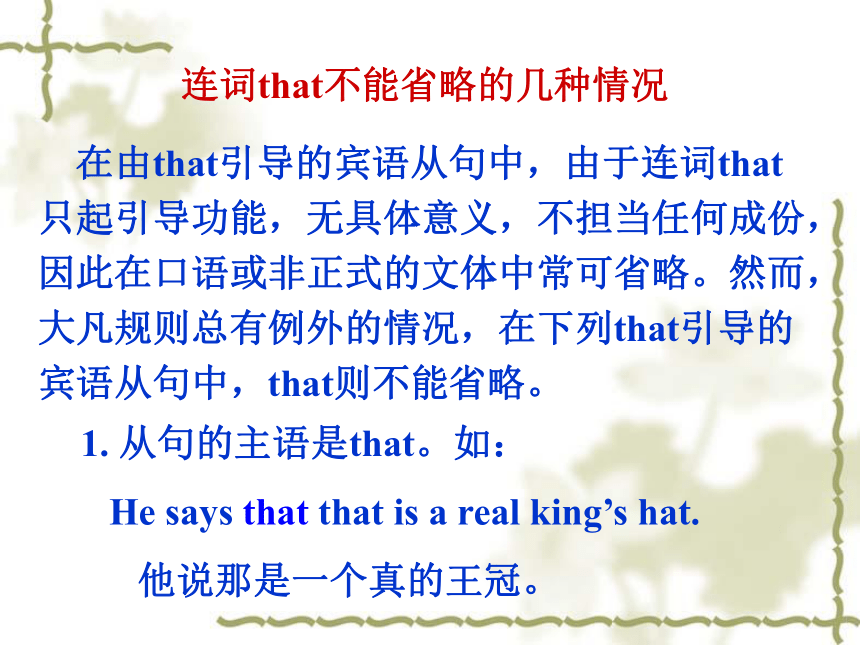
文档简介
(共49张PPT)
I think that mooncake are delicious.
Translate the phrases.
in the shape of
on the Mid-Autumn night
traditional folk stories
shoot down
live forever
fly up to the moon
call out one’s name
lay out
以 ... 形状
在中秋之夜
传统的民间故事
击落
长生不老;永生
向上飞向月亮
大声叫喊某人的名字
摆开;布置
I think that they’re fun to watch.
Mary thinks that the teams were fantastic.
Bill wonders whether they’ll have zongzi again next year.
I wonder if it’s similar to the Water Festival of the Dai people in Yunnan Province.
Read the sentences below, paying attention to the underlined parts.
I know that the Water Festival is really fun.
I wonder if they’ll have the races again next year.
I wonder whether June is a good time to visit Hong Kong.
I believe that April is the hottest month in Thailand.
I know that the Water Festival is really fun.
I wonder if they’ll have the races again next year.
I wonder whether June is a good time to visit Hong Kong.
I believe that April is the hottest month in Thailand.
Grammar Focus
Object clauses with
that, if and whether
一、宾语从句的概念
在句子中起宾语作用的从句叫做宾语从句。
We know that Mr Green teaches English.
She asked if these answers were right.
二、宾语从句三要素
引导词(连接词)
语 序
时 态
1. I hear (that) _______________________.
2. He said (that) ______________________.
3. The teacher told us (that) _______________ ________________.
he will be back in an hour
he missed us very much
the earth moves
由that引导的宾语从句
注:that 在句中无词汇意义,在从句中不充当成分,在口语当中往往省略。
around the sun
Object clauses with that
连词that不能省略的几种情况
在由that引导的宾语从句中,由于连词that只起引导功能,无具体意义,不担当任何成份,因此在口语或非正式的文体中常可省略。然而,大凡规则总有例外的情况,在下列that引导的宾语从句中,that则不能省略。
1. 从句的主语是that。如:
He says that that is a real king’s hat.
他说那是一个真的王冠。
2. that从句中含有主从复合句。如:
I’m afraid that if you’ve lost it, you must pay for it.
3. 主、从句之间有插入语时。如:
It says here, on this card, that it was used in plays.
卡片上写着,它是古代演戏用的。
4. 若出现两个或两上以上的由that引导的宾语从句,且由并列连词连接时,只有第一个连词that可以省略。如:
She said (that) she would come and that she would also bring her son.
她说她要来,还要带她的儿子来。
These planet will produce food and oxygen that we need to live on Mars.
Scientists will develop plants that can grow on Mars.
People think that humans on Mars have to wear special boots to make themselves heavier.
We all know that Mars is a planet in the solar system.
The journey to Mars could take only a very short time in space shuttles that travel at half the speed of light.
Some scientists do not believe that the journey to Mars will be very comfortable.
Which of the following sentences has an object clause
√
√
√
Ⅰ. if和whether引导宾语从句时,作“是否”讲,一般情况下,二者没有区别,可以换用。但if常用于口语中,whether比较正式。如:
Millie asked if / whether he liked this sweater.
米莉问他是否喜欢这件毛衣。
The fisherman wants to know if / whether it will rain.
渔民想知道天是否会下雨。
Object clauses with if and whether
由if / whether引导的宾语从句
Ⅱ. if和whether引导宾语从句时,要注意宾语从句三要素,即连词、语序和时态。由于if和whether连接的是一般疑问句,因此要注意把从句语序改为陈述句语序。如:
Does Mr Zhao live in Room 208 Could you tell me
→Could you tell me if / whether Mr Zhao lives in Room 208
Have you got any fish
What does the baby cat ask
He asks if his father has got any fish.
Am I cool
What does the baby
ask
He asks if / whether he is cool.
Do you love me
What did the girl ask the young man
She asked the young man if / whether he loved her.
Can I fly
What does the baby wonder
He wonders if / whether he can fly.
Will you
take me to
the sky
What does the girl ask the Spiderman
She asks the Spiderman if / whether he
will take her to the sky.
Ⅲ. if和whether的区别
二者在下列几种情况下不能换用:
1. 宾语从句置于句首表示强调时,应用whether,不用if。如:
Whether this is true or not, I can’t say.
这是否对,我不能说。
2. 宾语从句与or not直接连用时,应用whether,不能用if。如:
I don’t know whether or not he will come tomorrow.
我不知道他明天是否来。
3. 与动词不定式连用时,只能用whether。如:
She can’t decide whether to go to America.
她不能决定是否去美国。
4. 从句作介词宾语时,只能用whether。如:
I worry about whether I hurt her feeling.
我担心是否伤了她的感情。
5. 宾语从句的谓语动词是否定形式时,只能用if,不能用whether。如:
Tom wants to know if she won’t come here tomorrow.
汤姆想知道她明天是否不来这儿。
6. if意为“假如,如果”时,可以引导条件状语从句,而whether没有这个用法。如:
If Simon comes here tomorrow, I’ll call you.
假如西蒙明天来这儿,我将打电话告诉你。
1. 若主句是一般现在时,从句用任何所需时态。如:
He wants to know if / whether they had a good journey home.
他想知道他们回家旅途是否愉快。
She says (that) she works from Monday to Friday. 她说她从周一至周五上班。(从句是一般现在时)
She says (that) she will leave a message on his desk. 她说她要在他桌子上留个便条。(从句是一般将来时)
She says (that) she has never been to Mount Emei. 她说她从来没有去过峨嵋山。(从句是现在完成时)
2. 若主句是一般过去时,从句则用跟过去相关的时态。即一般现在时变为一般过去时、现在进行时变为过去进行时、一般将来时为过去将来时、现在完成时态变为过去完成时。
Did the train leave She didn’t know.
→She didn’t know if / whether the train had left.
一般现在时
一般将来时
一般过去时
现在完成时
现在进行时
一般过去时
过去将来时
过去完成时
过去完成时
过去进行时
He said there were no classes yesterday afternoon. 他说昨天下午没有课。(从句是一般过去时)
He said (that) he was going to take care of the baby. 他说他会去照看这个婴儿。 (从句是过去将来时)
He said (that) they were having a meeting at that time. 他说他们那时正在开会。 (从句是过去进行时)
1. 从句表达的是客观真理, 用一般现在时
2. 从句中有明确表示过去时间的词,则从句依然是一般过去时
The teacher told us that light travels faster than sound.
He wondered if you studied in the USA in 1990.
主句时态 从句时态
一般现在时、一般将来时、祈使句时 根据句意的需要用任意一种时态
一般过去时
与原句相对应的过去的时态
客观事实、真理、自然现象、名言警句、谚语等 一律用一般现在时
学习宾从三注意,时态语序和连词。
时态主从要呼应:
主句若为现在时,从句时态随句意;
主句若为过去时,从句时态变过去;
宾从若是表真理,时态不变无质疑。
语序要用陈述序,切莫照搬疑问句。
That 连接陈述句,省与不省要注意。
从句若表“是否”时,if / whether要慎记。
特殊问句作宾语,仍用原来疑问词。
三个问题需牢记,切莫丢东忘了西。
1. I don't know if Mr. Wang _____ on a field trip. If he _____ on a field trip tomorrow, please call me.
A. goes; will go B. will go; goes
C. will go; will go D. goes; goes
2. She asked me if I knew ______.
A. whose pen was it B. whose pen it was
C. whose pen it is D. whose pen is it
B
B
Choose the right answers.
3. They wondered if the teacher ______ us English the next term.
A. would teach B. had taught
C. will teach D. taught
4. The boy asked ______ any noise from outside.
A. whether had I heard
B. whether I had heard
C. whether have I heard
D. whether I have heard
A
B
5. I haven’t decide _____ I’ll go out or stay at home.
A. if B. when
C. why D. whether
6. I want to know ______ he loves you.
A. that B. what
C. if D. who
D
C
7. I wondered _____ our teacher was going to attend our party.
A. whether B. what
C. where D. that
8. I’d like to know _____ or not.
A. whether will he come
B. whether has he come
C. whether he will come
D. if he will come
A
C
根据汉语句子的意思完成下列英语句子。
1. 我认为玛丽不来了。
I don’t think Mary ______ ______.
2. 山姆给我说他准备去上海。
Sam told me that he _______ _______ for Shanghai.
3.我想知道今天晚上还有没有去北京的火车。
I want to know _________ there is a train to Beijing tonight.
will
come
was
leaving
if / whether
改为含宾语从句的复合句
1. Will the train arrive on time I want to know.
I want to know __________ the train _________ on time.
2. Did Peter come here yesterday Li Lei wants to know.
Li Lei wants to know ___________ Peter _________ here yesterday.
will arrive
if / whether
came
if / whether
1. 我们不知道我们能否在火星上种植植物。
We are wondering ____________________
______________ on Mars.
2. 你能告诉我是不是有许多人打算搬到火星上去吗?
Could you tell me _____________________ __________________ to Mars
whether / if we can
if / whether many people
are going to move
grow plants
Complete the sentences.
3. 我不知道他在家洗不洗衣服。
I don't know _________________________ any washing at home.
4. 我担心是否伤害了她的感情。
I am worried about __________________ _________.
whether or not he does
whether I hurt her
feelings
1. Uncle Wang came up to see __________ there was anything wrong with the machine.
2. The shop keeper asked my father ________ or not he wanted to choose a big Christmas tree.
if / whether
whether
3. I don’t know __________ to go or stay.
4. ________ that is true, what should we do
whether
If
5. ________ they will ever become future Olympic champions only time will tell.
Whether
Complete the sentences with if / whether.
( )1. — I wonder ___________.
— I'm afraid we'll be late.
A. how we can be on time
B. what we are going to do
C. why we get to school late
D. if we will arrive at the meeting on time
中考链接
D
( )2. We’ll plant trees tomorrow, and I don’t know _____ Tom will come and join us.
A. if B. which
C. what D. where
A
( )3. —Do you know ______ tomorrow
— Sorry, I don't know. You may surf the Internet.
A. whether will it rain B. if it will rain C. whether does it rain
B
( )4.—Mum, can we go to the art museum tomorrow
—Sure. But first we should find out ________.
A. what can we do B. where we can go
C. how can we go there D. if it will be open
D
( )5. We don’t know _______ the meeting will be held soon.
A. when B. what C. whether D. since
C
( )6. —Mary, could you tell me if your mother ______ our school sports meeting tomorrow
—I think she will come to school if she _____ free.
A. will take part in; will be
B. takes part in; is
C. will take part in; is
D. takes part in; will be
C
I think that mooncake are delicious.
Translate the phrases.
in the shape of
on the Mid-Autumn night
traditional folk stories
shoot down
live forever
fly up to the moon
call out one’s name
lay out
以 ... 形状
在中秋之夜
传统的民间故事
击落
长生不老;永生
向上飞向月亮
大声叫喊某人的名字
摆开;布置
I think that they’re fun to watch.
Mary thinks that the teams were fantastic.
Bill wonders whether they’ll have zongzi again next year.
I wonder if it’s similar to the Water Festival of the Dai people in Yunnan Province.
Read the sentences below, paying attention to the underlined parts.
I know that the Water Festival is really fun.
I wonder if they’ll have the races again next year.
I wonder whether June is a good time to visit Hong Kong.
I believe that April is the hottest month in Thailand.
I know that the Water Festival is really fun.
I wonder if they’ll have the races again next year.
I wonder whether June is a good time to visit Hong Kong.
I believe that April is the hottest month in Thailand.
Grammar Focus
Object clauses with
that, if and whether
一、宾语从句的概念
在句子中起宾语作用的从句叫做宾语从句。
We know that Mr Green teaches English.
She asked if these answers were right.
二、宾语从句三要素
引导词(连接词)
语 序
时 态
1. I hear (that) _______________________.
2. He said (that) ______________________.
3. The teacher told us (that) _______________ ________________.
he will be back in an hour
he missed us very much
the earth moves
由that引导的宾语从句
注:that 在句中无词汇意义,在从句中不充当成分,在口语当中往往省略。
around the sun
Object clauses with that
连词that不能省略的几种情况
在由that引导的宾语从句中,由于连词that只起引导功能,无具体意义,不担当任何成份,因此在口语或非正式的文体中常可省略。然而,大凡规则总有例外的情况,在下列that引导的宾语从句中,that则不能省略。
1. 从句的主语是that。如:
He says that that is a real king’s hat.
他说那是一个真的王冠。
2. that从句中含有主从复合句。如:
I’m afraid that if you’ve lost it, you must pay for it.
3. 主、从句之间有插入语时。如:
It says here, on this card, that it was used in plays.
卡片上写着,它是古代演戏用的。
4. 若出现两个或两上以上的由that引导的宾语从句,且由并列连词连接时,只有第一个连词that可以省略。如:
She said (that) she would come and that she would also bring her son.
她说她要来,还要带她的儿子来。
These planet will produce food and oxygen that we need to live on Mars.
Scientists will develop plants that can grow on Mars.
People think that humans on Mars have to wear special boots to make themselves heavier.
We all know that Mars is a planet in the solar system.
The journey to Mars could take only a very short time in space shuttles that travel at half the speed of light.
Some scientists do not believe that the journey to Mars will be very comfortable.
Which of the following sentences has an object clause
√
√
√
Ⅰ. if和whether引导宾语从句时,作“是否”讲,一般情况下,二者没有区别,可以换用。但if常用于口语中,whether比较正式。如:
Millie asked if / whether he liked this sweater.
米莉问他是否喜欢这件毛衣。
The fisherman wants to know if / whether it will rain.
渔民想知道天是否会下雨。
Object clauses with if and whether
由if / whether引导的宾语从句
Ⅱ. if和whether引导宾语从句时,要注意宾语从句三要素,即连词、语序和时态。由于if和whether连接的是一般疑问句,因此要注意把从句语序改为陈述句语序。如:
Does Mr Zhao live in Room 208 Could you tell me
→Could you tell me if / whether Mr Zhao lives in Room 208
Have you got any fish
What does the baby cat ask
He asks if his father has got any fish.
Am I cool
What does the baby
ask
He asks if / whether he is cool.
Do you love me
What did the girl ask the young man
She asked the young man if / whether he loved her.
Can I fly
What does the baby wonder
He wonders if / whether he can fly.
Will you
take me to
the sky
What does the girl ask the Spiderman
She asks the Spiderman if / whether he
will take her to the sky.
Ⅲ. if和whether的区别
二者在下列几种情况下不能换用:
1. 宾语从句置于句首表示强调时,应用whether,不用if。如:
Whether this is true or not, I can’t say.
这是否对,我不能说。
2. 宾语从句与or not直接连用时,应用whether,不能用if。如:
I don’t know whether or not he will come tomorrow.
我不知道他明天是否来。
3. 与动词不定式连用时,只能用whether。如:
She can’t decide whether to go to America.
她不能决定是否去美国。
4. 从句作介词宾语时,只能用whether。如:
I worry about whether I hurt her feeling.
我担心是否伤了她的感情。
5. 宾语从句的谓语动词是否定形式时,只能用if,不能用whether。如:
Tom wants to know if she won’t come here tomorrow.
汤姆想知道她明天是否不来这儿。
6. if意为“假如,如果”时,可以引导条件状语从句,而whether没有这个用法。如:
If Simon comes here tomorrow, I’ll call you.
假如西蒙明天来这儿,我将打电话告诉你。
1. 若主句是一般现在时,从句用任何所需时态。如:
He wants to know if / whether they had a good journey home.
他想知道他们回家旅途是否愉快。
She says (that) she works from Monday to Friday. 她说她从周一至周五上班。(从句是一般现在时)
She says (that) she will leave a message on his desk. 她说她要在他桌子上留个便条。(从句是一般将来时)
She says (that) she has never been to Mount Emei. 她说她从来没有去过峨嵋山。(从句是现在完成时)
2. 若主句是一般过去时,从句则用跟过去相关的时态。即一般现在时变为一般过去时、现在进行时变为过去进行时、一般将来时为过去将来时、现在完成时态变为过去完成时。
Did the train leave She didn’t know.
→She didn’t know if / whether the train had left.
一般现在时
一般将来时
一般过去时
现在完成时
现在进行时
一般过去时
过去将来时
过去完成时
过去完成时
过去进行时
He said there were no classes yesterday afternoon. 他说昨天下午没有课。(从句是一般过去时)
He said (that) he was going to take care of the baby. 他说他会去照看这个婴儿。 (从句是过去将来时)
He said (that) they were having a meeting at that time. 他说他们那时正在开会。 (从句是过去进行时)
1. 从句表达的是客观真理, 用一般现在时
2. 从句中有明确表示过去时间的词,则从句依然是一般过去时
The teacher told us that light travels faster than sound.
He wondered if you studied in the USA in 1990.
主句时态 从句时态
一般现在时、一般将来时、祈使句时 根据句意的需要用任意一种时态
一般过去时
与原句相对应的过去的时态
客观事实、真理、自然现象、名言警句、谚语等 一律用一般现在时
学习宾从三注意,时态语序和连词。
时态主从要呼应:
主句若为现在时,从句时态随句意;
主句若为过去时,从句时态变过去;
宾从若是表真理,时态不变无质疑。
语序要用陈述序,切莫照搬疑问句。
That 连接陈述句,省与不省要注意。
从句若表“是否”时,if / whether要慎记。
特殊问句作宾语,仍用原来疑问词。
三个问题需牢记,切莫丢东忘了西。
1. I don't know if Mr. Wang _____ on a field trip. If he _____ on a field trip tomorrow, please call me.
A. goes; will go B. will go; goes
C. will go; will go D. goes; goes
2. She asked me if I knew ______.
A. whose pen was it B. whose pen it was
C. whose pen it is D. whose pen is it
B
B
Choose the right answers.
3. They wondered if the teacher ______ us English the next term.
A. would teach B. had taught
C. will teach D. taught
4. The boy asked ______ any noise from outside.
A. whether had I heard
B. whether I had heard
C. whether have I heard
D. whether I have heard
A
B
5. I haven’t decide _____ I’ll go out or stay at home.
A. if B. when
C. why D. whether
6. I want to know ______ he loves you.
A. that B. what
C. if D. who
D
C
7. I wondered _____ our teacher was going to attend our party.
A. whether B. what
C. where D. that
8. I’d like to know _____ or not.
A. whether will he come
B. whether has he come
C. whether he will come
D. if he will come
A
C
根据汉语句子的意思完成下列英语句子。
1. 我认为玛丽不来了。
I don’t think Mary ______ ______.
2. 山姆给我说他准备去上海。
Sam told me that he _______ _______ for Shanghai.
3.我想知道今天晚上还有没有去北京的火车。
I want to know _________ there is a train to Beijing tonight.
will
come
was
leaving
if / whether
改为含宾语从句的复合句
1. Will the train arrive on time I want to know.
I want to know __________ the train _________ on time.
2. Did Peter come here yesterday Li Lei wants to know.
Li Lei wants to know ___________ Peter _________ here yesterday.
will arrive
if / whether
came
if / whether
1. 我们不知道我们能否在火星上种植植物。
We are wondering ____________________
______________ on Mars.
2. 你能告诉我是不是有许多人打算搬到火星上去吗?
Could you tell me _____________________ __________________ to Mars
whether / if we can
if / whether many people
are going to move
grow plants
Complete the sentences.
3. 我不知道他在家洗不洗衣服。
I don't know _________________________ any washing at home.
4. 我担心是否伤害了她的感情。
I am worried about __________________ _________.
whether or not he does
whether I hurt her
feelings
1. Uncle Wang came up to see __________ there was anything wrong with the machine.
2. The shop keeper asked my father ________ or not he wanted to choose a big Christmas tree.
if / whether
whether
3. I don’t know __________ to go or stay.
4. ________ that is true, what should we do
whether
If
5. ________ they will ever become future Olympic champions only time will tell.
Whether
Complete the sentences with if / whether.
( )1. — I wonder ___________.
— I'm afraid we'll be late.
A. how we can be on time
B. what we are going to do
C. why we get to school late
D. if we will arrive at the meeting on time
中考链接
D
( )2. We’ll plant trees tomorrow, and I don’t know _____ Tom will come and join us.
A. if B. which
C. what D. where
A
( )3. —Do you know ______ tomorrow
— Sorry, I don't know. You may surf the Internet.
A. whether will it rain B. if it will rain C. whether does it rain
B
( )4.—Mum, can we go to the art museum tomorrow
—Sure. But first we should find out ________.
A. what can we do B. where we can go
C. how can we go there D. if it will be open
D
( )5. We don’t know _______ the meeting will be held soon.
A. when B. what C. whether D. since
C
( )6. —Mary, could you tell me if your mother ______ our school sports meeting tomorrow
—I think she will come to school if she _____ free.
A. will take part in; will be
B. takes part in; is
C. will take part in; is
D. takes part in; will be
C
同课章节目录
- Unit 1 How can we become good learners.
- Section A
- Section B
- Unit 2 I think that mooncakes are delicious!
- Section A
- Section B
- Unit 3 Could you please tell me where the restroom
- Section A
- Section B
- Unit 4 I used to be afraid of the dark.
- Section A
- Section B
- Unit 5 What are the shirts made of?
- Section A
- Section B
- Review of Units 1-5
- Unit 6 When was it invented?
- Section A
- Section B
- Unit 7 Teenagers should be allowed to choose their
- Section A
- Section B
- Unit 8 It must belong to Carla.
- Section A
- Section B
- Unit 9 I like music that I can dance to.
- Section A
- Section B
- Unit 10 You're supposed to shake hands.
- Section A
- Section B
- Review of Units 6-10
- Unit 11 Sad movies make me cry.
- Section A
- Section B
- Unit 12 Life is full of the unexpected
- Section A
- Section B
- Unit 13 We're trying to save the earth!
- Section A
- Section B
- Unit 14 I remember meeting all of you in Grade 7.
- Section A
- Section B
- Review of Units 11-14
